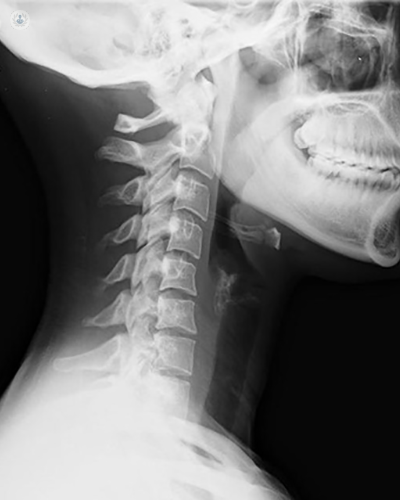Whiplash
Dr Sanjay Kuravinakop - Pain medicine
Created on: 10-23-2015
Updated on: 05-12-2023
Edited by: Conor Dunworth
What is whiplash?
Whiplash is an injury to the neck caused by a sudden movement of the head (backwards and/or forwards) which stretches and damages the soft tissues in the neck (they are sprained). Whiplash is commonly caused by car accidents.

What are the symptoms of whiplash?
The symptoms of whiplash usually take a few hours to develop and include:
- Neck pain
- Neck stiffness
- Difficulty moving your head
- Shoulder and arm pain
- Headaches
- Lower back pain
- Dizziness
- Difficulty sleeping
- Muscle spasms
- Pins and needles
Symptoms will usually worsen over the first few days following the injury. Recovery from whiplash can take a few weeks, a few months or longer in some cases.
What causes whiplash?
Whiplash is caused by a sudden movement of the head, either forwards, backwards or sideways. The most common causes of whiplash are:
- Car accidents
- A blow to the head, such as in boxing or rugby
- A fall where the head is jerked suddenly
Is whiplash serious?
Whiplash usually resolves itself on its own or following treatment, such as physiotherapy. Complications which can occur, such as damage to the neck’s joints, discs or ligaments, chronic pain or headaches, are very rare.
If, following an injury, you are experiencing the symptoms of whiplash along with any of the following, you should seek urgent medical attention:
- pain or stiffness in the neck which goes away and then returns
- very severe neck pain
- numbness or tingling in the shoulders, arms or legs
- bladder or bowel problems
- weakness in the arms or legs
- severe pain when moving the head

How can whiplash be diagnosed?
In general, damage to the soft tissues of the neck (muscles and ligaments) cannot be seen on a standard X-ray scan. Therefore, a diagnosis is usually made based on a physical examination which looks for muscle spasms and tenderness. Nonetheless, an X-ray, CT or MRI scan may be performed by the doctor to rule out any other type of injury, particularly if you have been involved in a serious accident.
What is the treatment for whiplash?
Usually whiplash will get better on its own, however, it can help to keep the neck mobile (neck braces are not recommended), to take painkillers to manage any pain and to carry out special stretches and exercises.
Physical therapy can also be recommended for whiplash patients. It can also help to apply ice to the neck the first twenty-four hours following injury.
How long does it take to recover from whiplash?
After between two and three months, patients usally successfully recover from their symptoms of whiplash and no longer experience discomfort or stiffness in the neck area.
What type of doctor treats whiplash?
Whiplash may be treated by specialist orthopaedic doctors, physiotherapists or chiropractors.








